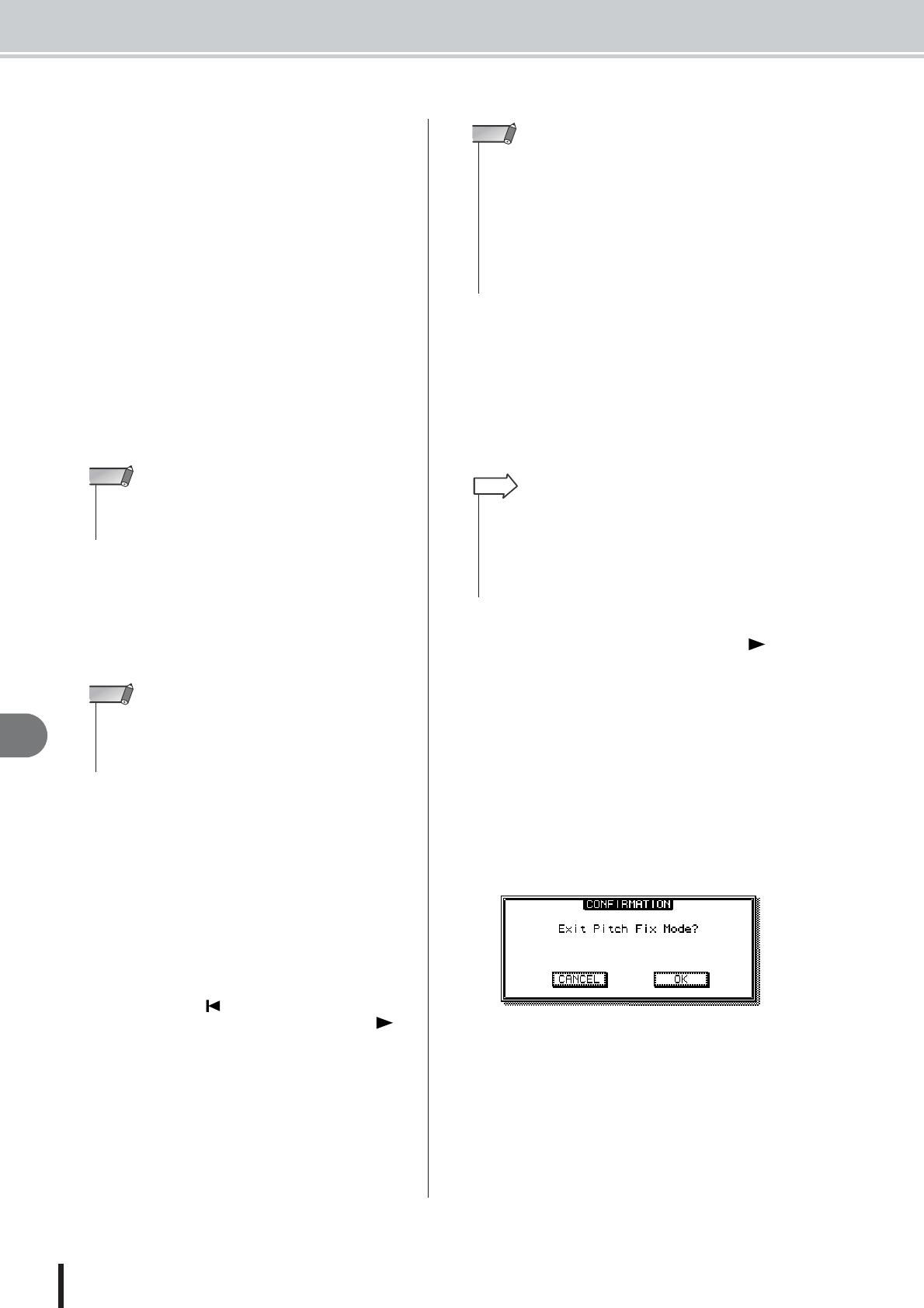
AW2400 Owner’s Manual
Correcting a Vocal Track (Pitch Fix)
Effects
126
14
E FIX NOTE field
These parameters are only available when PANEL is
selected in the CONTROL field.
• KEY.......................Sets the key of the graphic key-
board on the display.
• SCALE..................Sets the scale of the graphic
keyboard on the display:
CHROMATIC, MAJOR, MINOR,
or CUSTOM. When CUSTOM is
selected the keyboard’s buttons
can be used to directly specify a
scale for pitch correction.
F MASTER TUNING field
• IN/OUT knob........The IN knob sets the reference
pitch before correction, and the
OUT knob sets the reference
pitch after correction. The inte-
ger and fraction segments of the
value are set separately.
6
Raise the [STEREO] fader and the fader of
the source track channel to about 0dB on
the scale.
7
Raise the fader of the destination track
channel to about 0dB on the scale.
8
To set the scale for pitch correction select
PANEL in the CONTROL field and specify
the key in the FIX NOTE field.
For example, if PANEL is selected in the CONTROL
field and CHROMATIC is selected in the FIX NOTE
SCALE field, pitch will be corrected to the nearest
note in the chromatic (semitone) scale. You can also
specify the notes to be used for pitch correction by
selecting CUSTOM in the FIX NOTE SCALE field
and specifying the notes via the on-screen keyboard.
9
Press the RTZ [ ] key to rewind the song
to the beginning, then press the PLAY [ ]
key while holding the REC [●] key.
Song playback will begin and the processed data will
be recorded to the destination track.
The corrected signal can be monitored via the record
destination track channel.
10
Adjust the DETECT, RATE, and PITCH
parameters as required while recording the
song.
If NOTE is selected in the CONTROL field, you can
use a MIDI keyboard to specify the pitches for pitch
correction in real time while recording. This capability
can be useful when creating a harmony vocal track
based on the original vocal melody.
11
When the end of the song is reached,
rewind the song and press the PLAY [ ]
key.
The recorded pitch-corrected track will play back with
the other recorded tracks (the original uncorrected
track will not play back).
If you’re not satisfied with what has been recorded,
press the [UNDO/REDO] key to undo the recording
and go back to step 9.
12
Move the cursor to the EXIT button and
press [ENTER].
A popup window will appear asking you to confirm
that it’s OK to exit from the PITCH FIX mode.
13
To return to the Bounce page move the cur-
sor to the OK button and press the [ENTER]
key.
The PITCH FIX mode will be exited and the Bounce
display will appear.
• When the BYPASS button is engaged the signal before pitch
correction is output unaffected, regardless of the IN and OUT
knob settings.
NOTE
• The fader of the destination track — the track to which the
processed vocal track will be recorded — has no effect on the
recorded signal. The source track fader determines the final
balance, so set it with care.
NOTE
• The source track (the signal before correction) cannot be
monitored while the PITCH FIX mode screen is showing. Also
note that the record destination (the corrected signal) can
only be monitored when the recorder is set to the record
mode.
• When Auto Punch-in/out is engaged, you can monitor the
destination channel during playback even when not recording.
•To check the signal before pitch correction, engage the
BYPASS button to temporarily disable the Pitch Fix effect.
NOTE
•For optimum effect use the DETECT knob in addition to the
RATE knob in order to set the “depth” of the pitch correction
effect.
•You can create “robot voice” type effects by setting the RATE
and DETECT knobs to high values and using a MIDI key-
board to trigger sudden pitch changes.
HINT
